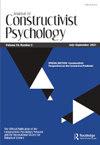“I Know What You’re Feeling…”: Narrative Observations Reveal Underlying Symptomatology
IF 0.7
4区 心理学
Q3 PSYCHOLOGY, CLINICAL
引用次数: 0
Abstract
Abstract Psychological symptoms are nested within autobiographical narratives. The narrative emotion process coding system (NEPCS) describes how people tell stories, identifying problematic narratives: Same Old Story, Empty Story, Unstoried Emotion, and Superficial Story. These markers refer to observable narrative features rather than a story’s content. Although related to the psychotherapy process, they have not been used to predict symptom distress independently. The current study examined whether the way people recount their stories is qualitatively different depending on the types of mental health symptoms they are suffering. 160 students suffering distress over unresolved personal issues completed clinical symptom inventories of depression, anxiety, and trauma and then completed 15 minutes of expressive writing. Written accounts were reliably coded for problematic narratives using the NEPCS. When a participant’s expressive writing sample revealed one or more problematic narrative, it predicted they were suffering more symptoms of anxiety (d = .70), depression (d = .44), and trauma (d = .33); such that they either approached or surpassed clinically relevant cutoffs. Problematic narratives explained 15.2% of symptom reports about anxiety, 9.6% for depression, and 7.8% for trauma. Narratives predicted symptomatology. Same old story and superficial story were the strongest predictors and associated with all dimensions of symptom distress.“我知道你的感受……”:叙述观察揭示了潜在的症状
摘要心理症状嵌套在自传体叙事中。叙事情感过程编码系统(NEPCS)描述了人们如何讲故事,识别出有问题的叙事:同样的老故事、空洞的故事、无方向的情感和肤浅的故事。这些标记指的是可观察到的叙事特征,而不是故事的内容。尽管它们与心理治疗过程有关,但尚未被用于独立预测症状困扰。目前的研究调查了人们讲述自己故事的方式是否因其所患心理健康症状的类型而有质的不同。160名因未解决的个人问题而感到痛苦的学生完成了抑郁症、焦虑症和创伤的临床症状清单,然后完成了15项 几分钟富有表现力的写作。使用《国家环境政策体系》对有问题的叙述进行了可靠的书面编码。当参与者的表达性写作样本揭示了一个或多个有问题的叙述时,它预测他们会出现更多的焦虑(d=.70)、抑郁(d=.44)和创伤(d=.33)症状;使得它们接近或超过临床相关的临界值。有问题的叙述解释了15.2%的焦虑症状报告,9.6%的抑郁症状报告,7.8%的创伤症状报告。叙述可以预测症状学。相同的旧故事和肤浅的故事是最强的预测因素,并与症状困扰的各个方面相关。
本文章由计算机程序翻译,如有差异,请以英文原文为准。
求助全文
约1分钟内获得全文
求助全文
来源期刊

Journal of Constructivist Psychology
PSYCHOLOGY, CLINICAL-
CiteScore
2.40
自引率
0.00%
发文量
22
期刊介绍:
Psychology and related disciplines throughout the human sciences and humanities have been revolutionized by a postmodern emphasis on the role of language, human systems, and personal knowledge in the construction of social realities. The Journal of Constructivist Psychology is the first publication to provide a professional forum for this emerging focus, embracing such diverse expressions of constructivism as personal construct theory, constructivist marriage and family therapy, structural-developmental and language-based approaches to psychology, and narrative psychology.
 求助内容:
求助内容: 应助结果提醒方式:
应助结果提醒方式:


